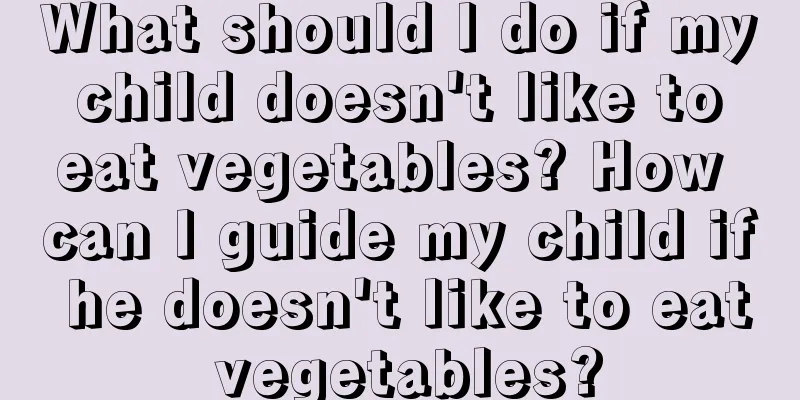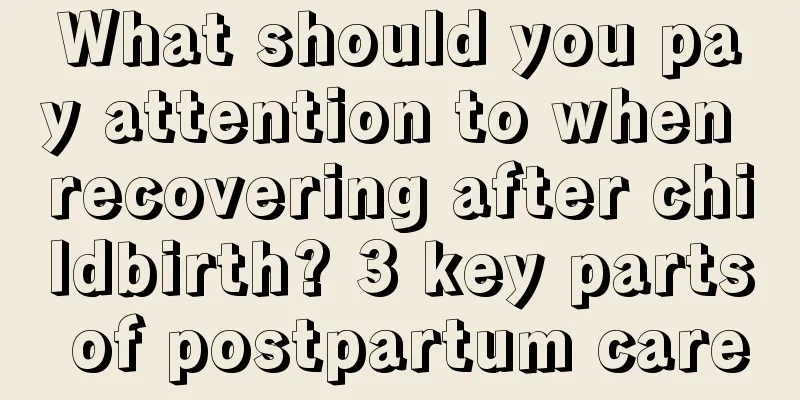What should I do if my child doesn't like to eat vegetables? How can I guide my child if he doesn't like to eat vegetables?

|
What should I do if my child doesn't like to eat vegetables? Many parents say that their baby doesn't like to eat vegetables. Today, let's talk about how parents should deal with the problem of their baby not liking to eat vegetables, and how to guide their baby to love eating vegetables. Let's talk about the problem of babies eating vegetables in detail. What to do if your child doesn’t like to eat vegetablesCurrent situation 1: Children refuse to eat vegetables! Reason: The appearance and smell of vegetables affect appetite Experts suggest that instead of forcing children to eat vegetables, it is better to start training their taste buds from the stage when they are still eating complementary foods, allowing them to be exposed to the taste of different foods. Perhaps this will greatly reduce the difficulty of feeding them. Many children do not like vegetables and always have to be coaxed or forced to eat them before they will reluctantly take a few bites. Why is this? Dr. Tang Guoting, chief physician of the Department of Pediatrics at National Taiwan University Hospital, explained that children between the ages of 1 and 3 begin to develop personal preferences for food, so the appearance or smell of food will often affect their appetite. He gave examples, such as spinach and bitter melon with strong flavors, green vegetables with unpleasant appearance, and basil, celery, and green peppers with strong food smells, which are all vegetables that children don't like. In addition, we also need to consider whether the child does not like to eat vegetables that need to be chewed because of poor chewing ability or does not like to chew. Current situation 2: Children love to eat meat! Cause: Parents’ feeding habits, with a preference for meat Secondly, the reason may lie with the parents. Because children's taste is cultivated by adults, if parents do not let their children try more vegetables and only focus on meat when adding complementary foods, it will be difficult to get children to eat more vegetables after one year old. There are seven major hazards for babies who don't eat vegetables: 1. Frequent constipation. 2. Damage to the intestinal environment. 3. Insufficient intake of vitamin C. 4. Insufficient intake of vitamin A. 5. Excessive intake of energy. 6. Frequent poor appetite. 7. Not liking to eat vegetables when growing up. It seems that it is harmful for children not to eat vegetables. Caring mothers should know that vegetables contain a variety of vitamins, minerals and dietary fiber, which are positive for the growth of children and should not be eaten less! The seemingly inconspicuous vegetables contain dietary fiber, which can not only increase intestinal peristalsis and reduce constipation, but also reduce the reabsorption of cholesterol, reduce the occurrence of high blood pressure and heart disease in the future, and are very helpful to the body. How to guide children who don't like to eat vegetablesIn fact, most babies still eat some vegetables, but they may only like to eat certain types of vegetables, or eat less. Parents can make their babies love eating vegetables by doing the following: First, you can let your baby go with you when you go shopping and let him choose the vegetables by himself. When you come back, you can ask him to help wash the vegetables. This way he will participate in the cooking process and he will cherish the fruits of his labor. Second, parents should change their cooking methods and try to make the dishes look, smell and taste good. For example, they can cook the dishes in broth, make them into steamed buns or dumplings with vegetable fillings, or even sometimes make the dishes into the shapes of small animals so that babies will like to eat them. Third, parents should set a good example by eating more vegetables when eating. If the baby can eat more vegetables every time, parents should continue to encourage the baby, so that the baby will gradually fall in love with eating vegetables. The consequences of babies not liking to eat vegetables1. Prone to constipation If you don't eat vegetables, you won't get enough fiber, which will have little irritation to the intestinal wall, causing the intestinal muscles to move less and the stool to stay in the intestine for too long. As a result, babies are prone to constipation and absorb the toxic components in the stool, affecting their normal metabolism and making them more susceptible to illness. Eating more vegetables can prevent constipation and other diseases in babies and increase their immunity and resistance. 2. Damage to the intestinal environment The cellulose in vegetables can promote the growth of beneficial bacteria in the intestines and inhibit the reproduction of harmful bacteria. Eating too little vegetables can easily destroy the growth environment of beneficial bacteria in the intestines and affect the intestinal absorption of nutrients. 3. Insufficient Vitamin C Intake Vegetables are the main source of vitamin C, which has a great impact on the development of babies. It can promote calcium deposition and is an essential nutrient for the healthy development of teeth and bones of babies who are growing rapidly. If you don't eat vegetables regularly, you are prone to symptoms such as pulp bleeding, pulpitis, soft and easy-to-break bones, subcutaneous bleeding and body infections. 4. Insufficient Vitamin A Intake Yellow-green vegetables are a rich source of beta-carotene, which can be converted into vitamin A in the human body. Lack of vitamin A will affect the baby's vision, skin, mucous membranes and other functions, resulting in night blindness, dermatitis or recurrent respiratory tract infections. 5. Often have poor appetite If babies do not eat vegetables, other physiological functions of the body will be affected, resulting in symptoms such as loss of appetite and poor appetite. 6. I don’t like to eat vegetables even when I grow up If your baby eats few vegetables and prefers meat since childhood, he or she will most likely find it difficult to accept vegetables when he or she grows up, and it will be very difficult to correct this behavior then. To solve the old problem of babies not liking to eat vegetables and always getting irritated, parenting experts suggest that parents can choose fruit and vegetable puree snacks rich in dietary fiber for their babies. Babies can not only get the nutrition of fruits, but also the nutrition of vegetables at the same time. |
Recommend
What causes baby's diarrhea? What should I do if my baby has diarrhea?
When I was changing my baby's diaper, I found...
How to effectively prevent the occurrence of early ectopic pregnancy
Ectopic pregnancy is very harmful to women. Exper...
What does pedophilia mean? What should I do if I have a pedophilia?
We have seen some pedophiles in movies and TV sho...
What is the difference between prenatal education and no prenatal education? Is prenatal education just listening to music?
Everyone should have heard of prenatal education ...
How to clean coral fleece quilt cover? How to clean coral fleece
In winter, many families use coral fleece four-pi...
What do fathers need to do in early childhood education?
Fathers play a very important role in early child...
What is the best age for children to learn talents? What is the best age for children to learn talents?
What is the best age for children to learn talent...
Can pregnant women eat ugly oranges? Can pregnant women eat ugly oranges?
Ugly orange is a special variety of orange. Altho...
What causes back pain during mid-pregnancy? What causes fetal arrest?
Many pregnant women will experience back pain dur...
Will sex during pregnancy cause the water to break? What should I do if the water breaks prematurely during sex?
The phenomenon of premature rupture of amniotic f...
How should I take care of myself when the due date is approaching? What are the key points of diet during the confinement period?
When the due date is getting closer, pregnant wom...
Can pregnant women eat plums? Can pregnant women eat plums?
Plums are very popular due to their unique taste,...
Is Blue Moon laundry detergent good for washing underwear? Can Blue Moon laundry detergent sterilize underwear?
When I use Blue Moon to wash clothes, I find that...
The benefits of drinking milk for children and the precautions for drinking milk for children
Milk is a very common drink in our daily life. Ma...
Can an 8-month-old baby eat crab porridge? Can an 8-month-old baby eat crab?
Now is the season for eating crabs. Many parents ...









